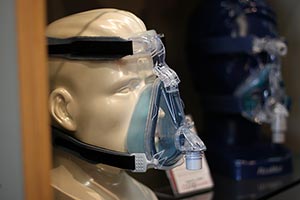Senior Reporter
Supreme Court Declines to Review a Driver's Sleep Apnea Lawsuit Against Crete Carrier Corp.

The U.S. Supreme Court has declined to hear a case involving an obese truck driver who claimed in a lawsuit that his employer, Crete Carrier Corp., should not have required him to submit to a sleep study to determine if he had sleep apnea.
The high court’s ruling to not grant the former driver, Robert Parker, a writ of certiorari means that an appeals court decision in Crete’s favor will stand.
Parker filed the petition with the Supreme Court on Feb. 13. Without comment, the court denied the petition on April 3.
RELATED: Appeals court rejects driver's claim that high BMI should not require sleep apnea study
The 8th U.S. Circuit Court of Appeals ruled that Crete Carrier Corp. did not violate Parker’s rights after he was referred to a sleep study because he had a body mass index of “35 or greater.”
The appellate court’s October opinion supported a lower federal court ruling dismissing the case.
A body mass index, or BMI, is a measure of body fat based on height and weight that applies to both adult men and women. A person with a BMI of 30 or more is considered obese.
Crete stopped giving Parker work after he refused to submit to a sleep study. Parker alleged that requiring the test for sleep apnea and withholding work was a violation of the Americans with Disabilities Act.
Crete ranks No. 33 on the Transport Topics Top 100 list of the largest U.S. and Canadian for-hire carriers.
But the carrier said a sleep study is the only way to confirm or rule out an obstructive sleep apnea diagnosis and that an in-lab sleep study is the “gold standard for diagnosing obstructive sleep apnea.”
The appellate court ruled that Crete had a “reasonable basis” for concluding that its drivers pose a safety risk due to a correlation between high BMIs and obstructive sleep apnea and that a sleep study requirement allows Crete to decrease the risk by ensuring that drivers with sleep apnea get treatment.
“The undisputed evidence shows that Crete suspended Parker for refusing to submit to a lawful medical examination,” the court said in its Oct. 12 opinion. “That does not violate the ADA. Since Crete’s stated reason for suspending him was not pretext, Parker’s claim fails.”
In court documents, Parker said that in June 2014, he was administered a Commercial Driver Fitness Determination examination by his physician, who said Parker “met the standards and qualified for a 2-year certificate,” and that the physician also noted “no concerns with health history. No limitations. No medication.”
Medical advisers to the Federal Motor Carrier Safety Administration until recently have recommended that drivers with BMIs greater than 35 receive only a conditional Department of Transportation certification and that they undergo an additional examination for obstructive apnea. However, the agency’s Medical Review Board recently revised the recommendation to a BMI of 40 or above as one of the risk factors for obstructive sleep apnea.

